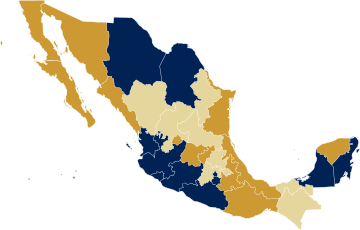Same-sex marriage in Mexico City
Same-sex marriage is legal in Mexico City —the Federal District of Mexico— having been approved by its Legislative Assembly on 21 December 2009, and signed into law by Head of Government Marcelo Ebrard on 29 December 2009.[1] The law was effective on 4 March 2010.[2]
Civil unions, known as Sociedades de convivencia and offering some of the rights of marriage, have been legal in the city since March 2007.
Legislative history
Being the seat of the Powers of the Union, Mexico City did not belong to any particular state but to all. After years of demanding greater political autonomy, residents were given the right to directly elect the Head of Government of the Federal District and the representatives of the unicameral Legislative Assembly (ALDF) by popular vote in 1997. Ever since, the center-left Party of the Democratic Revolution (PRD) has controlled both political powers.
In the early 2000s, Enoé Uranga, an openly lesbian politician and activist, unsuccessfully pushed a bill that would have legalized same-sex civil unions in Mexico City under the name Ley de Sociedades de Convivencia (LSC, Law for Coexistence Partnerships).[3] Despite being passed four times by legislative commissions, the bill repeatedly got stuck in plenary voting for its sensitive nature, which could be attributed to the widespread opposition from right-wing groups and then-Head of Government Andrés Manuel López Obrador's ambiguity concerning the bill.[4] Nonetheless, as new left-wing mayor Marcelo Ebrard was expected to take power in December 2006, the ALDF decided to take up the bill and approved it in a 43-17 vote on 9 November 2006.[4]
| Political party | Members | Yes | No | Abstain | Absent |
|---|---|---|---|---|---|
| 34 | 33 | 1 | |||
| 17 | 16 | 1 | |||
| 4 | 4 | ||||
| 4 | 2 | 1 | 1 | ||
| 3 | 3 | ||||
| 2 | 2 | ||||
| 1 | 1 | ||||
| 1 | 1 | ||||
| Total | 66 | 43 | 17 | 5 | 1 |
The law was well received by feminist and LGBT groups, including Emilio Álvarez Icaza, then-chairman of the Federal District's Human Rights Commission, who declared that "the law was not a threat to anyone in particular, and that it will be a matter of time before it shows positive consequences for different social groups." It was strongly opposed by right-wing groups such as the National Parents' Union and the Roman Catholic Church, which labeled the assemblymen who voted for the law as "sinners", and complained it was "vengeance against the Catholic Church from the more radical groups from the left, who felt it was a demand for justice."[4]
The law officially took effect on 16 March 2007.[5] Mexico City's first same-sex civil union was between Jorge Cerpa, a 31-year-old economist, and Antonio Medina, a 38-year-old journalist.[5] As of December 2009, 736 same-sex civil unions have taken place in the city since the law became effective, of which 24 have been annulled (3%).[6]
Same-sex marriage

On 24 November 2009, PRD assemblyman David Razú proposed a bill that would legalize same-sex marriage in Mexico City. According to Razú, "Gays and lesbians pay taxes like everyone else, obey the law like everyone else, build the city like everyone else, and there is no reason they should have a different and special set of rules."[7] The bill essentially sought to modify the definition of marriage contained in the Civil Code, using gender-neutral language. Razú added that the bill was "to be in agreement with Article 1 of the Constitution, which says that no person can be discriminated against for any reason, and with Article 2 of the Civil Code, which says that no person can be deprived of the exercise of their rights for reasons of sexual orientation."[7]
Emiliano Aguilar, PRI assemblyman, was criticized for giving out homophobic pamphlets, which showed transgender prostitutes with the inscription "Lawmaker, would you like to see your children ending up like this? Do not promote homosexuality."[8] Luis González Plascencia, chairman of the Humans Rights Commission of Mexico City, backed the bill and said that it was up to the ALDF to consider LGBT adoption.[8]
The International Lesbian, Gay, Bisexual, Trans and Intersex Association (ILGA), International Amnesty (AI), the AIDS Healthcare Foundation and over 600 non-governmental organizations supported the legalization of same-sex marriage in Mexico City.[9] The PAN has announced it will either go to the courts to appeal the law or demand a referendum.[10][11] However, a referendum on same-sex marriage was rejected by the Legislative Assembly in a 36-22 vote on 18 December 2009.[12]
On 21 December 2009, the Legislative Assembly approved the legalization of same-sex marriage in a 39-20 vote. PRD Head of Government Marcelo Ebrard had been expected to sign the bill. The bill changes the definition of marriage in the city's Civil Code from "a free union between a man and a woman" to "a free union between two people."[13] The law was written to allow same-sex couples to adopt children, apply for bank loans, inherit wealth and be included in the insurance policies of their spouse, among other rights they were previously denied under civil unions in the city.[14] The PAN vowed to challenge the law in the courts.[14]
On 29 December 2009, Head of Government Marcelo Ebrard signed the bill into law and it became effective on March 4, 2010.[1][2] On August 5, the Supreme Court voted 9-2 to uphold the constitutionality of Mexico City's same-sex marriage law.[15] On August 10, 2010, the Supreme Court ruled that same-sex marriages performed in Mexico City must be recognized throughout the country.[16]
| Political party | Members | Yes | No | Abstain | Absent |
|---|---|---|---|---|---|
| 34 | 34 | ||||
| 15 | 15 | ||||
| 8 | 2 | 5 | 1 | ||
| 5 | 5 | ||||
| 3 | 3 | ||||
| 1 | 1 | ||||
| Total | 66 | 39 | 20 | 5 | 2 |
Public opinion
An opinion poll conducted in September 2009 showed that the population of Mexico City was almost evenly divided on the issue of same-sex marriage, with 48% in favour and 46% against.[17]
From 27 November to 30 November 2009, major newspaper El Universal polled 1,000 Mexico City citizens concerning the legalization of same-sex marriage in the city. 50% supported it, 38% were against it and 12% had no opinion. The same poll showed that support was stronger among the youngest population (age: 18–29), 67%, and weaker among the oldest (age: 50 and up), 38%. With 48% the most cited reason was "right of choice" for the supporters, followed by "everybody is equal" with 14%. 39% of the opposers cited "it is not normal" as the main reason to not support same-sex marriage, followed by "we lose values" with 18%.[18]
Opposition
The National Action Party issued a statement calling the same-sex marriage bill "an electoral ploy by the PRD that mocks and abuses the gay community."[19] The Roman Catholic Church has strongly opposed the bill since it was taken up by the city Legislative Assembly earlier in September, by calling same-sex marriage, among other things, "immoral," saying marriage must hold the promise of procreation, something that is possible only between a man and a woman.[20] Armando Martínez Gómez, president of a Catholic attorneys group, called on Mayor Marcelo Ebrard to veto the bill, which Martínez noted went further than the city executive had intended when legislators removed a clause that would have forbidden adoption.[20]
See also
Footnotes
- 1 2 Mark Stevenson (Associated Press) (29 December 2009). "Mexico City enacts region's 1st gay marriage law". MSNBC. Archived from the original on January 2, 2010. Retrieved 30 December 2009.
- 1 2 Mónica Archundia (5 January 2010). "La primera unión gay, para marzo" (in Spanish). El Universal. Retrieved 5 January 2010.
- ↑ Latin American Herald Tribune (16 March 2009). "First Openly Gay Mayoral Candidate Runs in Mexico". Retrieved 15 December 2009.
- 1 2 3 Erich Adolfo Moncada Cota (19 November 2006). "Mexico City Approves Same Sex Unions". Retrieved 15 December 2009.
- 1 2 New York Times (17 March 2007). "A Milestone in Mexico City". The New York Times. Retrieved 15 December 2009.
- ↑ Fernando Martínez (25 December 2009). "Sociedades de convivencia, 97% en pie" (in Spanish). El Universal. Retrieved 26 December 2009.
- 1 2 Latin American Herald Tribune (24 November 2009). "Mexico City Lawmakers to Consider Gay Marriage". Retrieved 15 December 2009.
- 1 2 Mónica Archundia (25 November 2009). "Proyecto de matrimonio gay "divorcia" a la ALDF" (in Spanish). El Universal. Retrieved 15 December 2009.
- ↑ Anodis (11 December 2009). "Preparan dictamen de matrimonio entre personas del mismo sexo" (in Spanish). Retrieved 15 December 2009.
- ↑ Horacio Jiménez y Ella Grajeda (16 December 2009). "PAN amaga con impedir bodas gay" (in Spanish). El Universal. Retrieved 16 December 2009.
- ↑ Notimex (15 December 2009). "Recurrirá PAN a Corte de legalizarse 'matrimonio' entre homosexuales" (in Spanish). Yahoo! México. Retrieved 16 December 2009.
- ↑ Rocío González Alvarado (18 December 2009). "Rechaza ALDF referéndum para bodas gay" (in Spanish). La Jornada. Retrieved 18 December 2009.
- ↑ Associated Press (21 December 2009). "Mexico City 1st in region to approve gay marriage". Retrieved 21 December 2009.
- 1 2 Associated Press (21 December 2009). "Mexico City assembly legalizes same-sex marriage". Retrieved 21 December 2009.
- ↑ Dwyer Arce (August 6, 2010). "Mexico high court upholds Mexico City same-sex marriage law". JURIST - Paper Chase.
- ↑ Dwyer Arce (August 11, 2010). "Mexico high court rules Mexico City same-sex marriages must be recognized nationwide". JURIST - Paper Chase.
- ↑ Mexico City approves gay marriage
- ↑ El Universal (27–30 November 2009). "Same-sex marriage poll in Mexico City" (in Spanish). Retrieved 15 December 2009.
- ↑ Agence France-Presse (21 December 2009). "Mexico City approves gay marriage". Retrieved 21 December 2009.
- 1 2 Tracy Wilkinson (22 December 2009). "Mexico City approves gay marriage, adoption". Chicago Tribune. Retrieved 22 December 2009.
